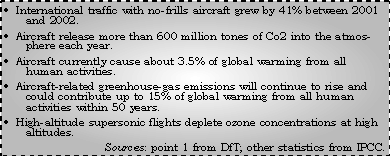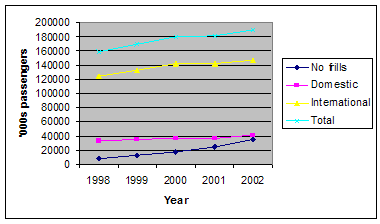
12:
Travel Broadens the MindMolly Scott Cato
H
oliday-makers returning to our airports from Asian tourist destinations struck by the Boxing Day tsunami have drawn attention to an aspect of the tragedy that must have struck many of us: the contrast between the survival chances of the tourists and the local people. This chimes in with a feeling many of us must have experienced when enjoying a week or two in another’s blissful climate: a vague sense of unease that we are experiencing luxury in a country where very few can aspire to that level of consumption.We respond to this uncertainty by reassuring ourselves that our money is helping the development of the countries we visit, that we are sharing a little of our wealth with them, that tourism represents a boon for poor countries. But how true is this? Tourism Concern has carried out a case-study of the classic holiday paradise affected by the tsunami: the Maldives. They found that nearly half the local population were living on just over a dollar a day. Competition for resources with tourist has actually reduced the standard of living for many, since fresh fruit and vegetables are sold to the tourist industry and have become unaffordable by local people. The UN reports that over 30 per cent of Maldivian children under 5 are suffering from malnutrition.
There is no question that tourism is now a key sector
of globalised capitalism. In fact it is the world’s biggest industry: it
accounts for 10.4 per cent of global GDP and provides 8.1 per cent of jobs
worldwide, employing an estimated 200 million people. Tourism is also allied to
another powerful lobby: the global aviation industry. Global tourism is only
possible because of the subsidies given to the aviation industry in the form of
tax exemptions on tickets, aircraft and fuel which have been valued at
£9.2billion per year. Aviation is the fastest growing source of carbon dioxide
emissions and yet its expansion is being encouraged. With large profits being
made from both these global industries no wonder we are being persuaded that the
best way we can help those hit by the tsunami is to continue to holiday on their
shores.
The current political rhetoric is that the solution to poverty in the global South is trade, and that for many with nothing else to trade, their climate will do. The current situation in the tourism industry gives the lie to this argument, which has always ignored the threats to vulnerable economies of the competition that is the organizing principle of the global trading system. Sri Lanka has turned to tourism because it is losing the fierce competition in the global textile industry, which still represents 65% of its industrial production. Western consumers, and those who organize and profit from their markets, have demanded ‘free’ trade and ever lower prices, so that the textile manufacture moves down the downward spiral to Vietnam and China, countries with even lower wages and conditions of exploitation. Sri Lanka’s protected quotas come to an end at the beginning of this year (1 January 2005). This was the big national concern before the tsunami struck. In spite of a unilateral decision by China to reduce its textile exports, the effect on the Sri Lankan economy will be devastating. It had turned to an expansion of tourism precisely to insulate itself against this.
Sri Lankan Exports of textiles to USA

In spite of the rhetoric, an observation of economic history makes it clear that the global trade system was established by Western nations for the benefit of Western nations. For me there has always been an uncomfortable parallel with our imperial past in the way we use our superior power, in this case mediated through our control of the global monetary system, to buy the resources and services of poorer nations. As we sit by the pool in some tropical paradise, served by a white-coated flunkey how far are we from our colonial ancestors? Tourism is now an object lesson in the way the powerful societies of the West treat the planet and its resources: we are bumming off the planet and bumming off its poorer people. Dissatisfied with the lives we have created for ourselves at home, in spite of our historically extreme levels of consumption, we feel the need to escape and return to countries whose people still enjoy a simpler attitude towards life. We fail to question the paradox at the heart of this choice which we might encapsulate in the phrase: if you’re so rich, how come you ain’t happy?
Links have been forged in the midst of this disasters and I hope these will be built on in the future. It will be difficult for those who have seen the poor of Sri Lanka or Thailand share their meager possessions and supplies with rich tourists temporarily laid low to ignore and neglect them in future. Perhaps the tsunami will offer an opportunity to explore the possibilities for constructing a solidarity economy between West and South that more radical development economists have been calling for. We could extend the thinking that persuades so many of us to buy fair trade coffee and tea towards genuine sharing in the welfare of the lives of those we have only met on unequal terms in the past. Our willingness to share our resources is plain from the rapid and unprecedented response to the appeal for charitable donations. It is not solely a response to emergency; it was evident before Christmas in the record number of people buying Christmas presents for each other in the form of donations of school equipment or chickens.
And what of tourism itself? My recommendation is that we rethink the ease with which we jet off for our unreal week on a palm-fringed foreign beach. The reason these holidays are cheaper than a similar holiday in the Mediterranean is that those who provide them are poor and desperate. The wages are low and working conditions poorer than any European would be prepared to tolerate. The cost of living is lower because the economic power of these nations is such that if it were not, very few people would survive there at all. In brief, we are using our national power to buy ourselves a cheap holiday. We are exploiting the people whose economies we claim to be supporting.

Figure 2. Increase in air travel, 1998-2002
Source: Department for Transport, 2003.
Just as many of us have decided to buck the market and pay a higher price for a fairly traded product we can make a choice to live in the sustainable economy we would like to be a part of in the 21st century by moving into the sustainable tourism sector. Many providers of sustainable tourist holidays are organized as cooperatives, so that our money is not siphoned off by entrepreneurs but really benefits the communities where we stay. We can think about planning our holidays in ways that are sensitive to economic as well as environmental realities.
The earthquake—and the consequent disasters—is the first globalised catastrophe on this scale to have been broadcast in such detail. It offers as many opportunities for learning as travel itself does. The first lesson we have learned is that advances in telecommunications have created the global village that has been talked about for so long. In the following months and years we need to learn other lessons about how we interact with other countries and their peoples, and the planet we all share.
Molly Scott Cato is a green economist. She works at the Welsh Institute for Research into Cooperatives in Cardiff.